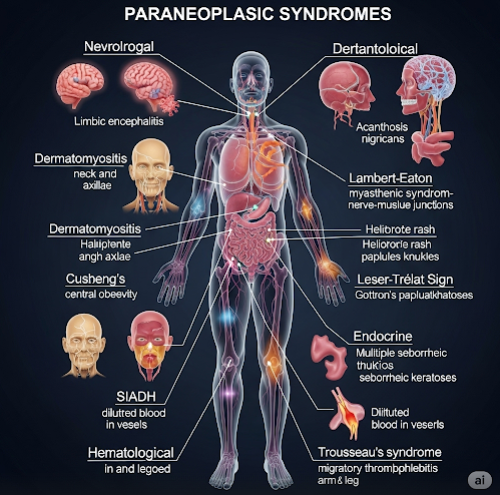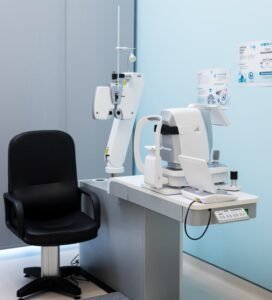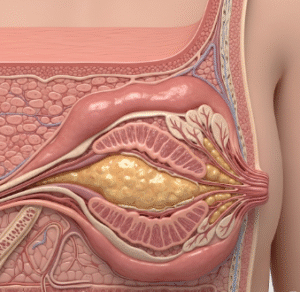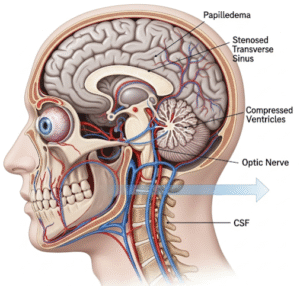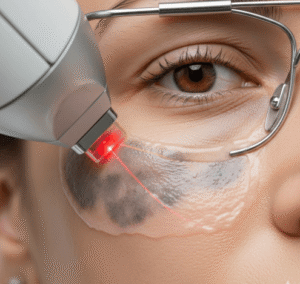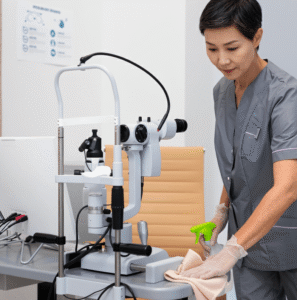Overview
Paraneoplastic syndromes are rare disorders that occur as a result of an abnormal immune system response to a cancerous tumor. Instead of being caused directly by the tumor mass itself or its metastasis, these syndromes arise from substances (like hormones or immune factors) secreted by the tumor or from the body’s immune reaction to the tumor. Paraneoplastic syndromes can affect various systems in the body—nervous, endocrine, dermatologic, hematologic, or musculoskeletal—and often present before a cancer diagnosis, serving as an early warning sign of an underlying malignancy.
What is Paraneoplastic Syndrome?
Paraneoplastic syndromes are a group of symptoms or disorders that are indirectly caused by a tumor, most commonly in cancers such as lung cancer, breast cancer, ovarian cancer, and lymphomas. These syndromes are not caused by the local presence of cancer cells but by the release of hormones, cytokines, or an autoimmune response triggered by the tumor.
Paraneoplastic syndromes can occur in many parts of the body and can sometimes be the first sign of cancer. They are often categorized by the system they affect:
- Neurological
- Endocrine
- Dermatological
- Hematological
- Rheumatologic
Symptoms
Symptoms vary depending on the type of paraneoplastic syndrome and the organ system it affects. Some common symptoms include:
Neurological:
- Muscle weakness
- Balance problems
- Difficulty swallowing or speaking
- Sensory disturbances
- Memory or cognitive issues
Endocrine:
- Cushing’s syndrome (weight gain, high blood pressure, high blood sugar)
- Hypercalcemia (confusion, nausea, vomiting)
- SIADH (low sodium levels, confusion, fatigue)
Dermatologic:
- Acanthosis nigricans (dark, velvety skin patches)
- Dermatomyositis (skin rash and muscle inflammation)
Hematologic:
- Anemia
- Thrombocytosis (high platelet count)
- Hypercoagulability (increased risk of blood clots)
Other:
- Fever
- Fatigue
- Unexplained weight loss
Causes
Paraneoplastic syndromes are caused by the immune system’s reaction to cancer or by biologically active substances (such as hormones or peptides) secreted by tumor cells. Some cancers “mimic” other cells in the body, causing the immune system to mistakenly attack healthy tissues, which results in the symptoms of paraneoplastic syndromes.
Common cancer types linked to these syndromes include:
- Small cell lung cancer
- Breast cancer
- Ovarian cancer
- Hodgkin’s and non-Hodgkin’s lymphoma
- Pancreatic cancer
Risk Factors
While any cancer can lead to a paraneoplastic syndrome, the following factors increase the risk:
- Having an undiagnosed or untreated cancer
- Older age (as cancer risk increases)
- Smoking (especially with lung cancer-associated syndromes)
- Genetic predisposition to autoimmune or oncologic diseases
- History of autoimmune disorders
Complications
If untreated, paraneoplastic syndromes can lead to significant complications, such as:
- Permanent neurological damage (especially in paraneoplastic neurological syndromes)
- Hormonal imbalances that can affect heart, kidney, or bone health
- Deep vein thrombosis (DVT) or pulmonary embolism
- Organ failure in severe metabolic syndromes
- Reduced quality of life and misdiagnosis if the underlying cancer is missed
Early recognition and treatment are crucial to prevent these serious complications.
Prevention
Paraneoplastic syndromes cannot always be prevented, especially if they are the first sign of a hidden cancer. However, the following steps may reduce the risk:
- Routine cancer screening based on age, family history, and risk factors
- Avoid smoking, a major contributor to lung cancer
- Prompt investigation of unexplained neurological or systemic symptoms
- Genetic testing in families with known cancer syndromes
- Immune system health maintenance, especially in high-risk individuals
Treatment Option in Korea
Korea provides world-class care for paraneoplastic syndromes through its advanced healthcare infrastructure. Top-tier hospitals such as Samsung Medical Center, Asan Medical Center, and Seoul National University Hospital offer multidisciplinary care with cutting-edge diagnostic and therapeutic options.
1. Treating the Underlying Cancer
- The primary goal is to treat the cancer causing the syndrome.
- This may involve surgery, chemotherapy, radiation, or targeted therapy.
- Successful cancer treatment often reduces or eliminates paraneoplastic symptoms.
2. Immunotherapy & Immune Suppression
- Steroids (e.g., prednisone) may be used to suppress immune system overactivity.
- Plasmapheresis or IVIG (intravenous immunoglobulin) is sometimes used in severe neurological syndromes.
3. Symptom-Specific Management
- Hormonal therapies for endocrine syndromes
- Anti-seizure or neuroprotective drugs for neurological symptoms
- Physical therapy and rehabilitation services for muscle weakness or paralysis
4. Precision Diagnostics
- Korean hospitals utilize advanced imaging (MRI, PET-CT) and biomarker tests to identify both the tumor and paraneoplastic processes.
- Antibody panels and cerebrospinal fluid (CSF) analysis are routinely used for neurological syndromes.
5. Multidisciplinary Approach
- Patients are cared for by neurologists, oncologists, endocrinologists, and immunologists working together to manage both cancer and immune-related effects.
6. Follow-Up & Monitoring
- Korean health centers offer structured long-term follow-up for relapse detection and immune-related complications.
- Many hospitals provide digital tracking and telemedicine for patient convenience.

